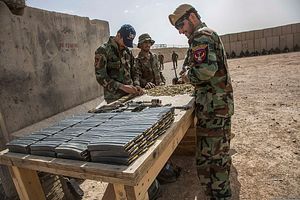A new Taliban commando force is testing the battle weary Afghan army in Helmand province. With reports of Helmand valley, a strategic location for Taliban opium financing operations, near collapse, questions need to be asked regarding this new commando unit.
Over the last year the Taliban have deployed a new commando unit of roughly 300 fighters. The results displayed so far this fighting season have been deadly, further highlighting that Afghan forces have yet to find a solution to counter this rising threat.
Deploying new tactics, the unit named Sara Khitta, which means Red Group or Danger Group in Pashto, has deployed new tactics to include employing night vision technology, night raids, and a tactical focus on cutting roads and supply lanes to towns and villages, instead of direct attacks on checkpoints and police stations.
The new tactics have supposedly lowered Taliban casualties, while allowing the group to capture large swaths of territory in Helmand. The Taliban now find themselves at the gates of Helmand’s capital city, Lashkar Gah, a city of roughly 200,000 inhabitants, and a scene reminiscent of last October’s collapse of Kunduz in northern Afghanistan.
Afghan forces have dispatched reinforcements to the strategically vital capital of Lashkar Gah in a last ditch effort to avoid a total collapse of the province. U.S. forces have also increased airstrikes in support of their Afghan hosts to push back the Taliban and provide breathing spaces for embattled forces attempting to hold back the onslaught.
As of Thursday morning, Afghan forces had managed to wrestle back Nawa district. Once considered one of the safest districts in Helmand, Nawa fell for a few hours to an advancing Taliban. Nestled on the outskirts of the capital, the collapse of Nawa district would allow the Taliban to encircle the capital and cut off supply routes. Also contested is Nad Ali district just north of Lashkar Gah, which has seen fierce fighting between Afghan commando forces and the Taliban.
The current situation in Lashkar Gah is tense; however, U.S. and Afghan representatives have dismissed concerns that the city could fall. U.S. Army Col. Michael Lawhorn told Voice of America, “We do not believe Lashkar Gah, or the province of Helmand, is about to fall. We remain confident that the Afghan forces are fighting effectively and that they will continue to secure Lashkar Gah.”
The appearance of such a highly trained and equipped Taliban force this fighting season leaves many questions and suspicions. Some have speculated that their equipment, including night vision goggles, was acquired during raids on Afghan forces or through corrupt commanders selling sensitive military equipment. As reported by ToloNews, an estimated 9 million rounds have been expended by Afghan forces in the last three months in comparison to British operations that expended 46 million rounds in eight years of combat in the restive province. Some speculate that this is evidence of endemic corruption, with local commanders and government officials selling sensitive equipment to insurgent elements for financial gain.
This also wouldn’t be the first time that corruption has threatened the collapse of Helmand Valley, with corrupt commanders stacking their force rolls with fake names or dead personnel to continue to collect government salaries.
































